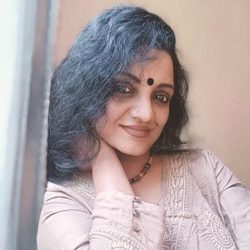Maybe precisely because of its ubiquity and relevance, this issue saw a windfall of submissions from all over the world. Selecting the poems humming with the struggle of self-definition, brimming with an ache of resisting and reinforcing gender, and triumphing with an unapologetic burst of existence was Herculean. Most of the poets, while they were writing gender, were also resisting gender. Many a time speaking about the omnipotence of the violence embedded within the system, they also wrote about control and liberation, pain and pleasure, and the agony and ecstasy of being chained under its weight. Sometimes, the poets slipped easily into overblown metaphors; sometimes they left behind a subtlety that left the reader fainthearted.
The unusual visual, syntactic, and musical components, which are at once familiar and strange, evoked irrepressible memories of injustice, venom, and toxicity. From the failing photographic memories of Nanima at the village well to Dida’s vegetable haul, the poets keep questioning history’s irreversible plots ; whereas , the ‘pan froths alone’ for a single mother, and ‘creatures of the night/ leap into the darkness/ where things spring from’. Sometimes, a poet doesn’t want to ‘wear gender/ like a definition’, sometimes she also wonders, ‘how do you kill/ the stench of a man burnt into ashes?’ Sometimes, it is a simple prayer, ‘we are girls/ all we wish for is to pass the night unscathed’, sometimes, it is the splintering insight of ‘This is how violent men drown/ inside queers to meet other men splitting into refugees.’
To the reader, these are poems not to be read, but engaged. They might nudge you into new ways of seeing, stirring questions, doubts, even discomfort as exquisite poetry often does. As we explore the intersection of poetry and gender, let us remember that both are, at their core, acts of creation. To define oneself, to step into the world and say this is who I am—is that not its own kind of poem?
In a world that often seeks to constrain definition and compartmentalization, let these poems be a reminder of what is possible when we embrace the fullness of humanity.

Subscribe to our newsletter To Recieve Updates
Usawa Literary Review © 2018 . All Rights Reserved | Developed By HMI TECH
Join our newsletter to receive updates